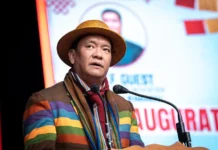NEW DELHI, 28 Jul: India on Thursday described as “unacceptable” China issuing stapled visas to a few sportspersons from Arunachal Pradesh, and asserted that it reserves the right to “suitably respond” to such actions.
External affairs ministry spokesperson Arindam Bagchi said that India has lodged its “strong protest” with the Chinese side on the matter and there should be no discrimination on the basis of domicile or ethnicity in the visa regime for Indian citizens.
People familiar with the matter said that the visit of a 12-member team of Wushu players to China’s Chengdu to compete at the World University Games was called off on Wednesday night as three players from Arunachal in the group were given stapled visas.
The decision to put on hold the team’s travel was taken after the government examined the matter.
“It has come to our notice that stapled visas were issued to some of our citizens representing the country in an international sporting event in China,” Bagchi said.
“This is unacceptable and we have lodged our strong protest with the Chinese side, reiterating our consistent position on the matter, and India reserves the right to suitably respond to such actions,” he said.
Bagchi said this at a media briefing while responding to a question on the matter.
“Our longstanding and consistent position is that there should be no discrimination or differential treatment on the basis of domicile or ethnicity in the visa regime for Indian citizens holding valid Indian passports,” he said.
While other members of the team received normal visas, the players from Arunachal were given stapled visas, the people cited above said.
In the past too, there were instances of China issuing stapled visas to Indians from Arunachal that drew sharp reactions from New Delhi.
China has been laying claims over Arunachal,k saying that it is part of Southern Tibet.
In April, India outright rejected China’s renaming some places in Arunachal, asserting that the state is an integral part of India and assigning “invented” names does not alter this reality. (PTI)



